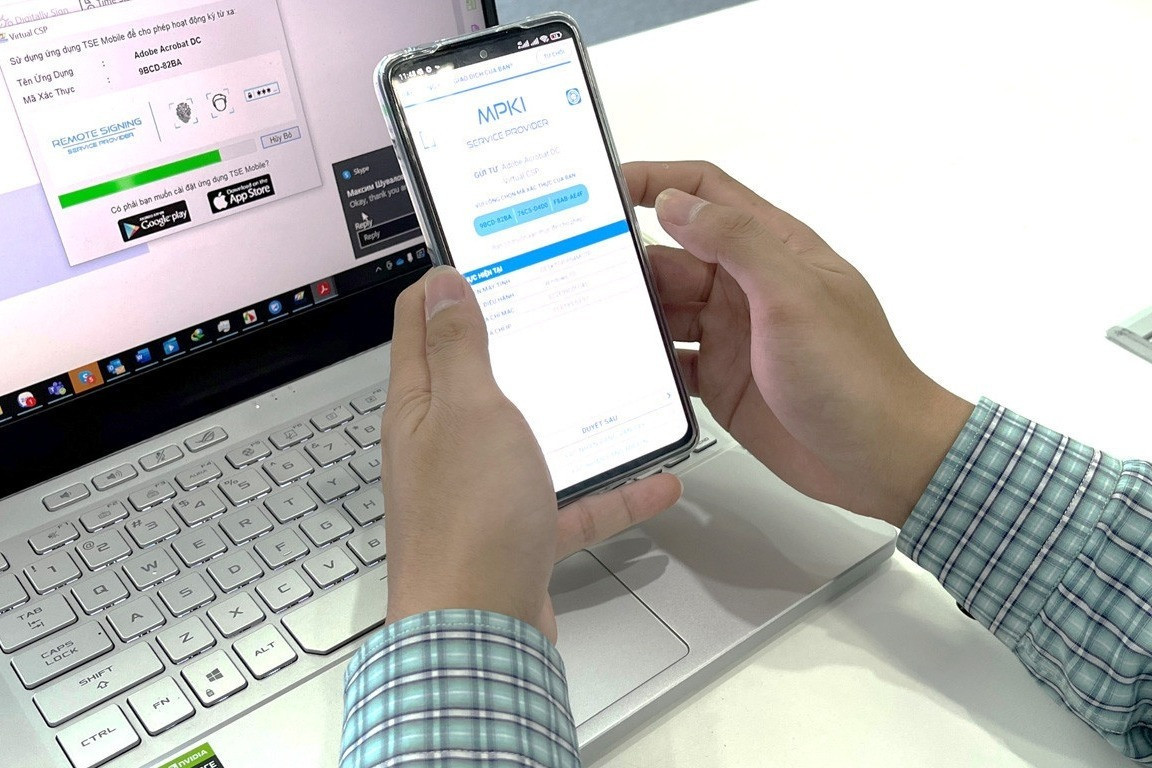Despite this significant growth, the rate still falls short of the ambitious targets set out in the National Digital Economy and Digital Society Development Strategy.

In recent years, digital signatures have increasingly demonstrated their crucial role, offering practical benefits for organizations, businesses, and individuals in establishing legal validity in electronic transactions and activities.
The growing use of digital signatures across various sectors, including economics, commerce, finance, healthcare, education, and public administrative services, has been recognized as a key element in creating digital citizens and advancing Vietnam’s digital economy and society.
According to the National Electronic Authentication Center (NEAC), the Ministry of Information and Communications (MIC) has licensed 25 enterprises to provide public digital signature certification services (CAs), including 10 that offer remote signing solutions. As of July 2024, public CAs had issued over 10.1 million digital certificates to individuals and businesses, an increase of more than 1.5 million compared to the end of last year.
Notably, in assessing the outcomes of the first four years of the National Digital Transformation Program, the standing agency of the National Committee for Digital Transformation reported positive developments in the digital society between 2022 and 2024. The percentage of adults with a digital or electronic signature rose from 3% to 13.5%, a more than fourfold increase.
However, when compared to the goals set out by the Vietnamese government in the "National Strategy for Digital Economy and Digital Society Development until 2025, with a Vision to 2030," this progress remains far from the target. The strategy aims for more than 50% of the adult population to have a personal digital or electronic signature by 2025.
Experts point out that one of the main reasons for the relatively low number of individual digital signatures is the limited environment for their application. Currently, personal digital signatures are mainly used in fields like tax declaration and payment, electronic customs, and social insurance.
Other sectors of social life, including banking and online shopping, are still only potential areas for promoting the use of personal digital signatures. Therefore, expanding the application environment for digital signatures is a critical challenge that needs to be addressed to popularize their use among the public.
As the coordinating agency for the National Digital Transformation Program, the MIC recognizes the importance and necessity of popularizing digital signatures to support the development of digital government, digital economy, and digital society. Under the guidance of the MIC, NEAC has been working with localities to implement various solutions to encourage people to use digital and electronic signatures in online transactions.
Additionally, NEAC has collaborated with public CAs to diversify service packages, adopting the prepaid service model commonly used in telecommunications. This model allows for prepaid digital signature packages and pay-per-sign packages tailored to the specific needs of different customer groups.
Phung Huy Tam, Chairman of the Vietnam Digital Signature and Electronic Transactions Club, under the Vietnam Information Security Association, told VietNamNet that individuals can now easily register for and obtain public digital signatures without incurring registration or maintenance costs.
"Moreover, the service costs provided by public CAs are tailored to the specific usage needs of each customer, with various service delivery methods such as unlimited signature subscriptions for as low as 5,000 VND per month or pay-per-sign options at 1,000 VND per signature," Tam explained.
Looking ahead, a NEAC representative revealed that the MIC has set targets for the percentage of adults with digital or electronic signatures in each locality from now until 2025. The MIC has also requested that local governments develop plans and implement strategies to meet these targets, with a focus on promoting the use of digital signatures in electronic transactions in areas such as online public services, electronic documents, e-invoices, e-contracts, e-banking, e-healthcare, and e-school records.
"Localities should push for 100% of public services to utilize digital signatures, reducing paperwork and saving time for citizens. In many areas, people are still required to submit hard copies of documents even though they have been issued digital certificates but lack the means to use them," the NEAC representative emphasized.
NEAC plans to organize training and workshops for local officials and community digital technology groups in the coming months to educate them on the benefits of digital signatures, how to register, and how to use remote digital signatures in documents and on public service portals with integrated signature functionality.
Under the Electronic Transactions Law 2023, effective from July 2024, an electronic signature is a signature created in electronic data form, attached to or logically associated with a data message, to identify the signatory and confirm their approval of the data message.
A digital signature is an electronic signature that uses an asymmetric cryptographic algorithm, consisting of a private key and a public key, where the private key is used to sign and the public key is used to verify the digital signature. Digital signatures ensure authenticity, integrity, and non-repudiation, but do not guarantee the confidentiality of the data message.
Van Anh